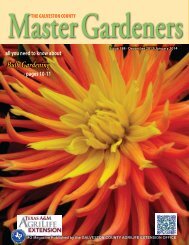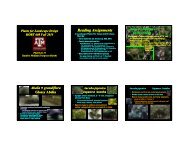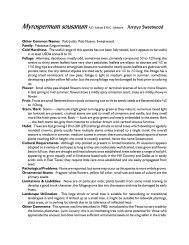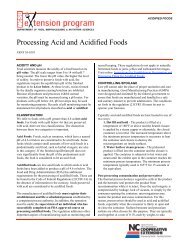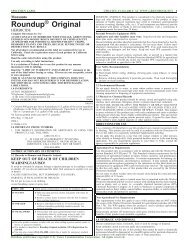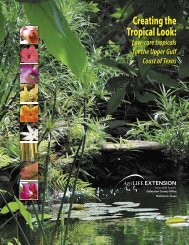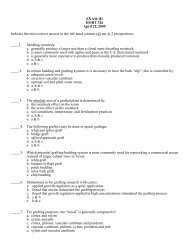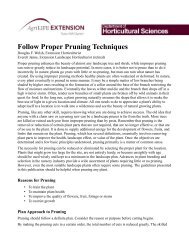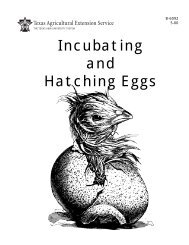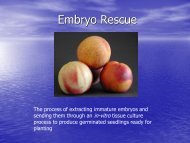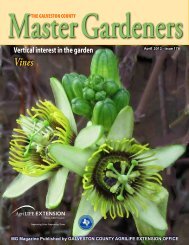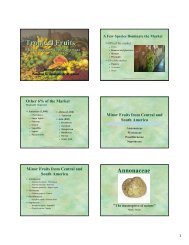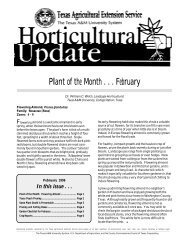Opuntia albicarpa Scheinvar cv. “Reyna” - Aggie Horticulture - Texas ...
Opuntia albicarpa Scheinvar cv. “Reyna” - Aggie Horticulture - Texas ...
Opuntia albicarpa Scheinvar cv. “Reyna” - Aggie Horticulture - Texas ...
You also want an ePaper? Increase the reach of your titles
YUMPU automatically turns print PDFs into web optimized ePapers that Google loves.
viii<br />
Micorrizas arbusculares en ecosistemas áridos y semiáridos<br />
Arbuscular mycorrhizae in arid and semi-arid ecosystems<br />
Preface<br />
Although root systems are usually mycorrhizal in most native and many crop lands, plants often grow nicely<br />
without their fungal symbionts when water and nutrients are abundant, in fertilized and irrigated fields, greenhouses<br />
and growth chambers.<br />
But when soils and substrates are dry, substantially differences in performance or behavior between nonmycorrhizal<br />
and mycorrhizal plants often widen. Some nutrients become less mobile as soils dry, and mineral<br />
absorption by roots not having external scavenging hyphae may seriously lag that of mycorrhizal<br />
roots. Stimulative effects of arbuscular mycorrhizal (AM) symbiosis on stomatal behavior and leaf gas<br />
exchange often become more pronounced as soils dry. When water is limiting, AM symbiosis can result in<br />
altered rates of water movement into, through and out of host plants, with consequent effects on tissue hydration,<br />
leaf physiology and plant ecology. Physiological effects involve changes in hormonal and osmotic relations,<br />
photosynthesis, protein synthesis and enzyme activity, carbohydrate and amino acid metabolism, and<br />
various soil-root and within-plant hydraulic conductances. Ecological effects involve reproductive potential,<br />
biodiversity, biogeochemical cycling, carbon sequestration, plant fitness and competitiveness.<br />
Recent work reveals that AM symbiosis can control aquaporin expression and regulate water flow in roots,<br />
as well as modify redistribution of water in soils via roots (“hydraulic lift”). AM fungi can have dramatic effects<br />
on antioxidant enzymes in droughted roots. Their ability to act as biocontrol agents can intensify during water<br />
deficit. We also now know that the moisture characteristics of soils themselves can be modified by AM symbiosis.<br />
Simply growing in mycorrhized soil a soil in which AM symbiosis has flourished previously and modified<br />
soil structure and biochemistry can alter the water relations of a nonmycorrhizal plant.<br />
Water deficit continues to be perhaps the chief environmental constraint of plant productivity in natural and<br />
managed lands. Its control on plants is obvious in arid and semi-arid areas, but even in relatively moist places<br />
around the globe, transient drought can have devastating adverse effects on agriculture during summer<br />
months. In addition to native and agronomic field situations, AM symbiosis has been studied extensively in horticulture,<br />
where plants are typically given ample water throughout their cropping but may be exposed to water<br />
deprivation during shipping and marketing and after transplanting. Even here AM symbiosis may have important<br />
consequences on water balance.<br />
This is the first book devoted entirely to the myriad ways in which AM fungi influence the ecology and biology<br />
of arid and semi-arid areas. It is a timely and important volume. Worldwide, fresh water supplies are diminishing,<br />
and irrigation water is becoming more saline; AM symbiosis also modifies plant resilience to soil salinity<br />
and sodicity. This book addresses critical roles of mycorrhizal colonization in deserts and in dryland farming, in<br />
such areas as functional diversity, nutrition, resource islands, and crop and ecosystem management. It identifies<br />
the AM fungi that inhabit roots of important arid plants, and it summarizes several case studies that provide<br />
important insights into ecosystem function.<br />
Ph. D. Robert M. Augé<br />
Institute of Agriculture, University of Tennessee, USA<br />
2006 Steering committee, International Mycorrhiza Society<br />
E-mail: auge@utk.edu



